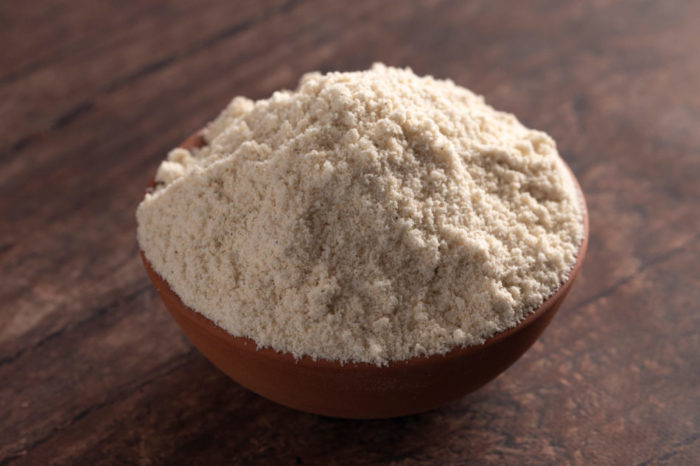Do you want to enjoy sweet delicacies without worrying about too many carbs and calorie intake? Opt for sorghum flour in your recipes. Not only is it gluten-free, but it also has a highly nutritious profile. You can also find it easily in the local market.
However, this flour is very versatile and you may run out of it without even noticing. So always keep one of these substitutes for sorghum flour in your pantry.
Sorghum flour has become a key ingredient for modern baking. It’s a healthier choice than most others and offers a lower calorie and carb count. The flour has been used for thousands of years and is now seeing a resurgence in its use. And baking has come forth as a big use for Sorghum flour. Yet, there are equally healthy substitutes to look at as well.

Best Sorghum Flour Substitutes
We require an alternative that can act fluffiness and soft texture to baked recipes. And like sorghum flour, it should be packed with nutrients. Here are the best options.
1. Buckwheat Flour
Buckwheat is a pseudocereal derived from the knotweed family of flowering plants. Its seeds are ground to form buckwheat flour.
It is naturally dense and binds the dough or batter well. This flour has a rich earthy and nutty flavor. Although the taste is more intense than sorghum flour, it works well in all its recipes.
Use this flour to make cookies, noodles, pancakes, or snacks. While working on a recipe that needs a lift of the mixture, like cake, add a lighter flour to it. Using this light flour and buckwheat flour in equal amounts would work.
Use the same amount of buckwheat flour as you would sorghum flour in a recipe.
It is gluten-free and contains antioxidants, complex carbohydrates, calcium, and proteins.
2. Xanthan Gum
Although xanthan gum is not flour, it is an apt substitute. It is made by fermentation of the bacteria Xanthomonas campestris on sugar.
Using this gum in dough or batter adds to its elasticity and binding property. It also increases the volume of the batter. So the bread, cake, or muffins made from it are soft and fluffy. You can also make cookies and pancakes with it.
Add half a teaspoon of xanthan gum to one cup of gluten-free flour. Although this gum imitates gluten in properties, it is gluten-free.
3. Teff Flour
Teff flour is an important component of Ethiopian cuisine. Injera, an Ethiopian flatbread, uses this flour. It is obtained from teff grains and can be used as a substitute in many recipes.
This flour partway melts on heat exposure. So the baked goods have a slightly creamy, and overall spongy texture. You can use it to make pancakes, cookies, muffins, and pizza crust. While making a dough, mix it with other gluten-free flour for better binding.
You’ll find light or ivory teff flour, or dark or brown teff flour in the market. Choose as per your preference.
Teff flour is gluten-free and rich in dietary fibers, vitamins, and minerals. It helps increase the RBC count in our body and promotes the growth of good gut bacteria.
4. Tapioca Flour
Tapioca flour is obtained from cassava roots. It is a form of starch and hence, is cheaper than other alternatives.
This flour is a good binding agent in dough and batter. When used to prepare baked food, it adds a nice rise and fluffiness. You can also use it as a thickening agent in soups or gravies. But remember to not use too much as it can attain a sticky, runny consistency. It’s also useful for making pie crusts and granola bars.
Tapioca flour is flavorless. This factor comes in handy when preparing cakes or muffins. You can play with the tastes in the recipe. But in case you want a little sweetness, add maple syrup or agave nectar to it.
It is gluten-free and contains essential minerals and helps diabetic people to maintain a healthy blood sugar level.
5. Coconut Flour
This sorghum flour substitute is made by grinding coconut meat. Due to this, it has a naturally sweet taste.
Coconut flour has the highest fiber content of all other sorghum flour alternatives here. This provides more absorbance to the flour and makes it a good binding agent. Use this flour to prepare cookies, muffins, and pancakes.
However, while preparing the dough, you’ll need to avoid using too much water. In any recipe use half a cup of coconut flour in place of one cup of sorghum flour. Coconut flour is gluten-free with low carbohydrate content. It boosts immunity and reduces the risk of stroke and heart diseases.
6. Potato Starch
Potato starch is dried starch derived from potato peels. It is different from potato flour.
Like sorghum flour, it is a good binding agent. Use this light flour to make cupcakes, muffins, or cookies. It adds a nice lift to the delicacies.
Potato starch also finds use as a thickener. But remember not to boil it or use too much or it acquires a gummy texture. To prevent this, use this flour combined with some other starch or light flour.
In any recipe, use potato starch in the same amount as sorghum flour is used. Potato starch is a gluten-free prebiotic and hence, good for gut health. It contains potassium, calcium, phosphorus, and vitamins B and C. This flour is also rich in glucose and provides instant energy.
7. Almond Flour
Almond flour is slightly sweet and has a nutty flavor. Being a natural binding agent, it works well in baking recipes. It contains natural oil that makes the dough or food moist and soft. So you don’t need to mix it with another flour.
Almond flour can replace sorghum flour in all recipes. Simply follow a 1:1 ratio.
It is a gluten-free, dairy-free, and paleo-friendly ingredient. It contains vitamin E, which is a natural antioxidant, and magnesium that helps maintain blood sugar levels. This flour is low on carbs and calories and lowers the risk of heart diseases and cancer.
8. Corn Starch
Corn starch is a thickening and binding agent with a mild flavor. It is cheaper than other sorghum flour alternatives and can be found easily.
Employ it as a thickening agent in stews, soups, and sauces. In cakes and other baked goods, it adds fluffiness.
Use it in the ratio of 1:1, but the amount of fluid required will vary. Although cornstarch lacks any essential nutrients, it is gluten-free and has a low glycemic index.
Read more: 14 Best Corn Flour Substitutes To Try
9. Rice Flour
Rice flour is easily available in the local market. You’ll find both white rice and brown rice flour. Use either, but brown rice flour is healthier as it is undefined and has a high fiber content.
This flour is light and adds a velvety texture to cakes and muffins and a nice crisp to savory snacks. However, it can easily form lumps. So use it mixed with starch or some other flour.
Rice flour is gluten-free and contains choline which is good for liver health.
FAQs About Sorghum Flour And Its Substitution
What does sorghum flour do in baking?
Sorghum flour is great for improving the texture of baked goods. It has a ton of protein and fiber, which will help your baked goods like bread and muffin get better stability and structure. Besides, it has a taste very similar to wheat, so the flavor of your baked goods won’t get a radically different taste.
Is sorghum flour the same as xanthan gum?
Sorghum flour and xanthan gum are different materials. Yet, xanthan gum often accompanies sorghum flour, especially in baking. That’s because the flour is gluten free, so it needs a binder to create stable and delicious baked goods. Xanthan gum fills that role, while still keeping the product gluten-free.
Is sweet white sorghum flour the same as sorghum flour?
Yes. Sorghum flour goes by several names, including sweet white sorghum flour, milo flour, and jowar atta flour. It has a taste very similar to whole wheat flour and thus either flour can be used by substituting in a 1:1 ratio.
The Right Sorghum Flour Alternative For Your Recipe
Sorghum flour has multiple uses in the kitchen. From preparing dough and batter to being used as a thickening agent, it does it all. At the same time, it is a healthy ingredient. We discussed 9 alternatives that imitate sorghum flour in function and nutritional qualities. Consider the texture and flavor your recipe requires. Then you can choose which of these substitutes for sorghum flour work best.
